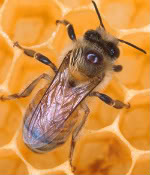A decline in diverse plants species on which to feed may be causing a similar decline in bee survival, according to a new paper in Biology Letters.
Researchers found that bees consuming a diverse number of plants produce more effective glucose oxidase (GOX) than bees which eat from a monoculture. Glucose oxidase is essential for bees to preserve food for their larvae, keeping the hive healthy. In addition, bees fed a diverse diet also produced more fat, which in bees produce anti-microbial chemicals to help resist disease.
This “would mean they have better antiseptic protection compared to other bees, and so would be more resistant to pathogen invasion,” lead author Dr. Cedric Alaux from the French National Institute for Agricultural Research (INRA) in Avignon told the BBC.
Bees, vital pollinators and producers of honey, have been suffering mysterious declines around the world.
Related articles

(01/29/2009) Plato once said: “numbers are the highest degree of knowledge: it is knowledge itself.” By Plato’s standards researchers have just discovered that the honey bee is a knowledgeable insect indeed. The honey bee can count to three in an instant according to a new study in the online journal PLoS ONE. Using dots and other abstract symbols, scientists from the Vision Centre in Australia tested whether the honey bees had the ability to count items in their environment.
Billions of disappearing bees linked to virus
(09/06/2007) Scientists have linked the disappearance of tens of billions of bees to a virus, reports a study published in the 7 September issue of the journal Science. Colony collapse disorder (CCD), in which colonies inexplicably lose all of their worker bees, has been blamed for the loss of 50-90 percent of colonies in beekeeping operations across the U.S.
20-40% of U.S. bees have disappeared
(05/14/2007) Known and unknown ailments have killed 20 to 40 percent of bee colonies across the United States this winter according to a leading entomologist.














